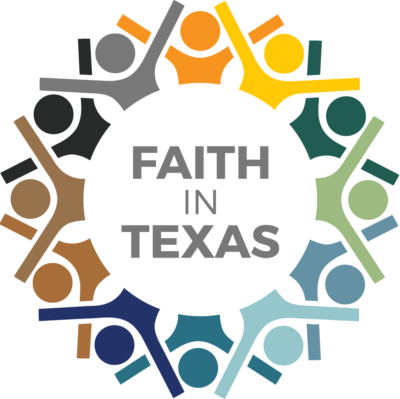At Faith in Texas, our core belief is that all humans have inherent worth and deserve to be treated with dignity, care, and respect. Every person deserves to have their needs met during this crisis because every person is a sacred creation with inherent worth. Without bold leadership, those who are most vulnerable – who hold the least power and agency – will be asked to carry the greatest economic and health burdens of this pandemic. Laid-off and furloughed workers will lose their homes because they lack tenant’s rights and access to housing assistance. Incarcerated people who cannot afford bail will be left to suffer higher rates of infection and death as they are kept in squalid conditions in our county jails. Immigrants will face increased economic suffering and exposure as they are overlooked by relief efforts while ICE continues to operate.
The COVID-19 pandemic represents an unprecedented crisis. The community we have built is being put to the test. Times of crisis always reveal our most deeply held values. If we value all people – if we value equity, love, and compassion – we must act to ensure everyone helps share the burden of the COVID-19 crisis in proportion to their ability, not their vulnerability. The policies and actions described below ensure our response to this crisis does not overlook or oppress the vulnerable and the marginalized in our community. They ensure we spread the burden fairly because our community is strong only when it works together; when we share our struggles and our joys and when we look out for our neighbors and not just ourselves.
We are a resilient people. We will rise to this challenge by holding close to our values. And when we do, our light will break forth like the dawn – and our healing will be from more than a virus.
“Is not this the kind of fasting I have chosen: to loose the chains of injustice and untie the cords of the yoke, to set the oppressed free and break every yoke? Is it not to share your food with the hungry and to provide the poor wanderer with shelter—when you see the naked, to clothe them, and not to turn away from your own flesh and blood?
Then your light will break forth like the dawn, and your healing will quickly appear; then your righteousness will go before you, and the glory of the Lord will be your rear guard.
Then you will call, and the Lord will answer; you will cry for help, and he will say: Here am I.” – Isaiah 58:6-9
Download the full platform here.
HOUSING
For the duration of this crisis, and the months of economic hardship that will follow, it is a moral and public health imperative that people’s homes are secure. Evictions and utility disconnections put people at risk for either temporary or permanent homelessness, therefore making our public health situation far worse for both their families and the community. The balance of justice and compassion is an essential part of the culture of Dallas. If we are to ask people to stay at home, we must do all we can to keep their homes safe.
- Cities should do everything in their power to halt evictions, including notices, and lockouts.
- Cities should seek and use all available funds to provide housing assistance to those most in need.
- Public Housing Authorities should expand access to Housing Choice Vouchers by reducing barriers for voucher eligibility and usage
- Landlords should do everything within their power to assist tenants impacted by COVID-19, including halting all evictions, lease terminations, rent increases, and late fees
- Landlords should protect their workers and communities by providing paid sick leave and personal protective equipment to essential workers, and increasing cleaning and sanitation in common areas
[expand title=”Full Housing Recommendations”]
Cities should:
- Pass an Anti-Eviction “Right to Cure” Ordinance that requires landlords to give a tenant a notice of proposed eviction prior to giving an impacted tenant a notice to vacate, which gives the tenant at least 60 days to respond, including curing any delinquent payments, before an eviction is filed.
- The Mayor should issue guidance that no new eviction notices should be posted, no lockouts should occur, and no liens should be placed during the COVID-19 crisis.
Public Housing Authorities should:
- Exercise their discretion to ease existing penalties that would cause impacted tenants to lose their vouchers due to the current economic instability, such as longer periods of time in search of housing that accepts vouchers and unreported decreases in income.
- Exercise their discretion to reduce barriers for voucher eligibility that are not mandated by federal guidelines, including restrictions for those with a criminal record.
- Exercise their discretion to provide assistance prior to completing the verification process for immigration status and not require additional documentation to verify U.S. Citizenship that is not already mandated by federal guidelines.
- Ensure the briefing packets given to voucher recipients outlining where vouchers are accepted are up-to-date.
Landlords should:
- Remove leasing restrictions for those with vouchers, criminal backgrounds, and foreign IDs.
- Sign on to the Just Housing COVID-19 Pledge when released to adhere to best practices, including:
- Halt all evictions (including notices), lease terminations, and rent increases for the duration of the crisis.
- Eliminate late charges and other fees for the duration of the crisis.
- Provide incentives for on-time or early rent payments.
- Waive amenity fees for amenities that can’t or shouldn’t be used during social distancing.
- Increase cleanliness in common areas such as mailboxes, the main office, etc., by having a more frequent cleaning schedule and providing items like wipes and sanitizer dispensers.
- Provide personal protective equipment and paid sick leave for essential staff.
[/expand]
DECARCERATION
Decarceration is crucial for the sake of public health and safety. To protect people who are incarcerated and held in immigration detention centers, their families, and our communities, the safest and most effective way to respond to this crisis is to:
- Drastically reduce the number of people in the Dallas County jail and all immigration detention centers by releasing as many people as possible and stopping new admissions.
- Ensure the health and safety of all people incarcerated in the Dallas County jail and all immigration detention centers.
[expand title=”Full Decarceration Recommendations”]
Judges should:
- Use all mechanisms available to (1) immediately release anyone who is being held pretrial and is eligible for release, as well as all people held on probation and parole technical violation detainers or sentences, (2) immediately release all people serving a sentence who are within six months of their release date.
- Identify and release medically vulnerable people in the general population and specifically in the pretrial population. This includes, but is not limited to, people age 50 and older, pregnant people, and people with compromised immune systems.
- Responsibly release all immigrant detainees currently in ICE custody with priority given to people with pre-existing health issues, and anyone who has already been given bond but has not bonded out due to lack of financial resources.
- Default to noncustodial sentences, including resolutions that avoid immigration detention where outbreak potential is highest.
Law enforcement should:
- Decline criminal charges whenever possible. For charges not declined, reduce as many as possible to citations or non-warrant, non-arrest charges with return dates that are at least 6 months from the date of the alleged incident.
- Stop making custodial arrests in order to discourage incarceration.
- Cite and release all who are eligible under the Texas Code of Criminal Procedures (Article 14.06).
- Suspend all CBP and ICE enforcement activity throughout the North Texas-Oklahoma region that is not directly related to a specific public safety issue.
- Suspend deportations and transfers of detainees.
The Sheriff, County Commissioners, and City Council should:
- Provide the public with a clear, transparent plan to ensure the health and safety of people incarcerated at the Dallas County jail and all immigration detention centers.
- Provide incarcerated people with free testing and treatment, and enact clear sanitation protocols in the jail and detention facilities.
- Make phone and video calls free for people in all jails and detention centers.
- Ensure all emergency provisions are made available to immigrants, including undocumented people.
- Extend paid sick leave to all employees, including those with temporary or part-time employment status.
- Eliminate any and all medical co-pays or sick-call fees.
- Provide a public plan to address the needs of vulnerable unhoused residents and recently released individuals.
- Give emergency funding to the Dallas County Public Defenders and court-appointed attorneys to support getting people out of custody and into housing and support services.
- Immediately institute a 90-day moratorium on any housing and services restrictions for people with a history of justice involvement.
[/expand]
DEMOCRACY
As we continue to navigate the COVID-19 crisis and its imminent aftermath, we must not let public health and voting integrity challenges deter us from ensuring equitable representation in our democratic process. It is more important than ever that all voters have the information needed to exercise their critical right to vote and be counted.
[expand title=”Full Democracy Recommendations”]
The Mayor and City Secretary should establish and enforce protections for our democracy and the right to vote with safe expanded opportunities to vote during this crisis and an expanded census to ensure every person is counted:
- Streamline voter registration with an online option.
- Expand eligibility requirements for absentee ballot recipients.
- Provide sufficient resources in elections and ensure voting is accessible to all.
- Invest in bilingual integrated voter engagement (IVE) and outreach.
[/expand]

